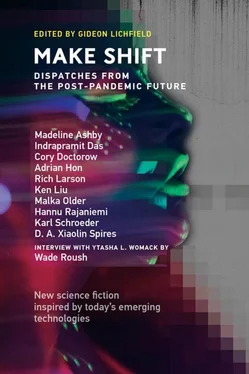He’s overtuned his glasses in his hurry, and they go flatly realist for a second, then color- and contrast-enhance everything. He can see every pore on Kraft’s face, and every scuff on the floorboards. “Good morning,” Remy says, walking over to the two ordinary chairs that sit facing each other in the center of the space. Bright pink ropes coil around the legs and back of one of them.
Kraft is standing behind that chair, and another man Remy recognizes as the medical examiner is kneeling in front.
Kraft is looking at him; does he expect something? Remy casts about for a helpful statement, and finally comes up with, “This placement is interesting.”
“What placement?” Kraft stares at him.
Remy feels like he’s made some kind of faux pas, and clears his throat. “The chairs are sitting in the acoustic center of the space.” He sweeps his hand in a circle. “It’s a fifty-foot cube, with a loft overhang fifteen feet wide on the entrance side.” His glasses gave him all these measurements; it’s so much easier to navigate using the numbers than to drown in the visual details of the actual place.
He walks past Sendak, who smiles at him, and over to one wall. There’s a radiator and above that a half-open window of heavy wired glass. “Somebody climbed out there?” Remy asks. “I saw blood stains in the parking lot.”
Sendak nods. “What about the placement?”
“A normal person would be more furtive. Whoever did this wasn’t ashamed. He wanted his victim to hear his own screams reflected back… It’s very deliberate.”
Kraft laughs humorlessly. “Well, an amateur wouldn’t have dissected this guy’s forearm while he was still alive.”
“Oh? And the victim still climbed out a window ten feet off the floor? Who is he?”
“Ralph Cawley,” says Kraft crisply. “Computer programmer, lives on the east side. He’s alive, and made it to a hospital before he collapsed. When he’s awake enough to talk, he’s refusing to do so. But the reason I called you is Cawley’s family, his wife and daughters, they’re missing. Looks like yesterday, just after he escaped. Seems to me whoever took him wants something, and didn’t get it from him on their first try. Now they’ve got his wife and girls. Finding them is the most important thing right now.” Kraft looks at Remy, who recognizes his frown.
“You called me because you’re grasping at straws.”
Kraft blows out a breath. “Sendak’s boys have already been all over this place and Cawley’s not cooperating. You’re a genius at noticing little details that other people miss. I thought you could help, is all.”
The examiner is on his feet now, dusting his hands. He eyes Remy. “Those smart glasses you wear. They have something to do with it?”
“I’m very sensitive to noise and light,” he tells the examiner. “Nikola Tesla was the same way. These help me narrow in on important details. Tune out the background.”
“A cousin of mine is on the spectrum. Maybe he could use a pair.”
“They need to be custom designed. I know a guy who does the programming.”
Remy notices that he’s started tapping his belt in a repeating pattern, one-two-three-four, one-two-three-four. He searches himself for signs of agitation, finds faster breathing, that he’s swaying a bit on his feet. He starts turning down the detail in the room. “As I was saying, whoever tortured Cawley arranged this setting for maximum effect. Probably a man, who clearly wanted something from him. Cawley… the name sounds familiar. What kind of programming does he do?”
Kraft pulls out his phone and flips through his notes. “Sez here… homomorphic encryption systems. Secure voting. Didn’t you do some work on that?”
Remy nods once, has to do it three more times. He turns down the room’s detail some more. “There could be a motive. He may have wanted Cawley to tell him how to hack the quadratic polling system. Even torture didn’t work, though, so he decided to take the family hostage. For leverage. I say ‘he’ because if it was just one person, he had to leave Cawley alone to go after them. That’s how Cawley escaped.”
He turns up his glasses so he can see Kraft better. “You’re right, we need to find the kidnapper right away, before he decides that what Cawley told him is true.”
“Which would be…?”
“That hacking the vote is impossible.”
“I KNOW WHAT ‘DOWN THE HALL’ MEANS,” REMY SAYS IN THE CAR, FIFTEEN MINUTESlater.
“What do you mean?” He’s memorized Sendak’s broad, indigenous face and noted that she has a ready smile. Her squad car isn’t one of the new self-driving models, but he’s developing a theory that she likes driving, from the way she attentively steers them through complex downtown traffic.
“I heard Kraft say to the examiner, ‘he’s the responsibility of the boys down the hall.’ I know what that means.”
She shifts in her seat. “Do you mean he thinks of me as your babysitter?”
“No. Major Crimes is one of the few departments left over from the old police force. Kraft resents the replacements, like the Mental Health Emergency Task Force, Short-Term Housing, Domestic Abuse. The targeted initiatives. They’re all down the hall from his office, along with your Forensics department.”
“Don’t rain all over Kraft. He’s watched his whole way of life turn into a dumpster fire. The pandemic, the defunding, then the economic reset—you should be grateful he hasn’t joined all the other old geezers in their bunkers, with their canned beans and ammunition.”
“Where are we going again?” Remy tunes his glasses down to the point where they’re gliding through a featureless blockworld.
“To the Cawley house. Kraft thought you might spot something there.”
“Something that your team missed.”
“Well I haven’t been there yet either. You want to make a bet who’ll find the first clue?”
Remy blinks at her.
He says, “Community Outreach is more likely to get you results. Maybe someone in the neighborhood saw something.”
“Yeah, yeah. You’re gonna tell me it’s faster and more effective than looking under shoes. Everybody says that, lately.”
“Maybe we should bet. Where is the Cawley house?” She tells him and he nods. “That’s near where I live. I can make you lunch.”
“Remy, we have three missing people to find. No lunch.”
“Oh, of course.”
“Argh, they’re drowning us with those things!” She’s glaring at something above street level; he fumbles with his detail levels and looks up to see some billboard screens. One is screening a referendum ad: Vote Early, Vote Often! A little up the avenue another is saying Buy Votes for Citizens’ Panels. His glasses’ preferences highlight a more distant one that says Testing Centers Get No Traffic in Ten Days, but Sendak’s probably not talking about that one.
She says, “Back at the crime scene you said you thought they didn’t like what Cawley told them. Something about the vote.”
“It can’t be a coincidence that he helped program the system. There is the referendum coming up.”
“Yeah.” She returns her attention to the traffic. “Not sure what to think about that, myself. Not that I’m feeling murderous, but potentially changing how our municipal democracy works is a pretty big deal. There’s a lot of people just like Kraft, they want to keep the old city council even though it was totally corrupt. For them the referendum choices amount to another huge change after years of change—and nobody over fifty understands quadratic voting anyway. Five years ago I’d never heard of it.”
“I remember Cawley a little now, though I never met him in person,” says Remy. “Before I… moved into the city… I worked a bit with his team. That was at the tail end of the Third Wave. Even then he was getting huge push-back—people either wanted to crack his code so they could rig the vote, or they wanted to prove it could be hacked so they could derail the whole project.” He watches the signs dwindle behind them. “I vote whenever I can, but a lot of people resent not being allowed to vote every time.”
Читать дальше












